
March 11, 2019
|
Rachel Keidan
by Rebecca Goldfine
Photographs by Sean Alonzo Harris
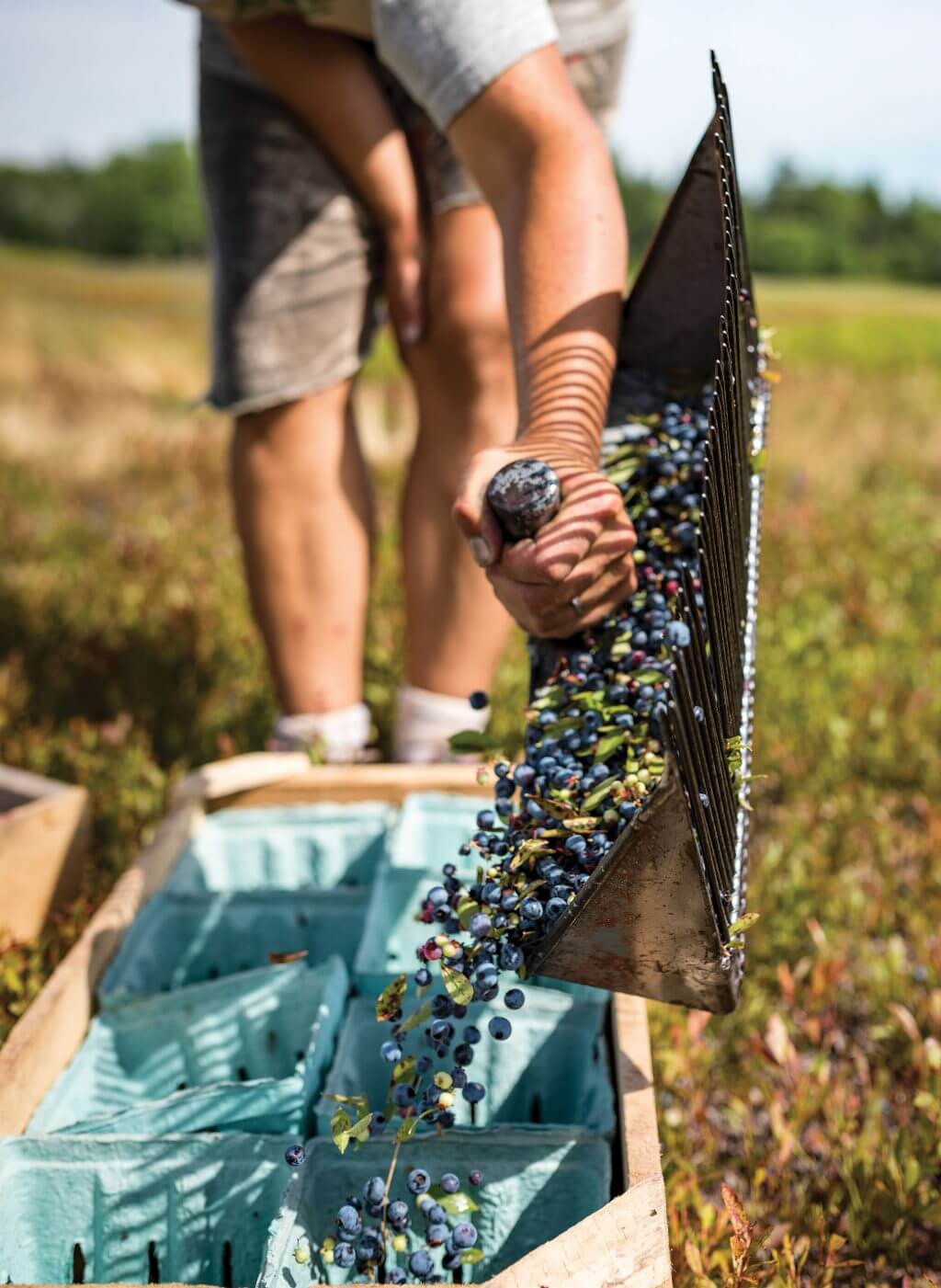
fBlueberry season brings traffic to the remote barrens of Down East Washington County, and to Helen’s Restaurant, a Machias mainstay since 1950. At Helen’s, guests line up at the counter for the signature whipped cream-topped pie filled with a quart-and-a-half of fresh, uncooked berries. The berries in their nationally-famous pie are all tended to sweet plumpness from nearby Welch Farm’s foggy perch in Roque Bluffs. “Out by the ocean, the berries taste better,” Helen’s owner Julie Barker says of the hand-raked product Welch Farm delivers daily to the restaurant, in season. “They are always free of sticks and leaves, and never soggy.”
Washington County farms like Welch and nearby Moon Hill Farm constitute an otherwise mom-and- pop backbone of Maine’s 500-plus blueberry farms, working to transfer their enterprises to the next generation in an era of consolidation and depressed blueberry contract prices. Father-daughter duo Lisa and Wayne Hanscom run Welch Farm with help from relatives, including Wayne’s ex-mother-in-law. Their family has held the farm since 1912, when Wayne’s grandfather, Frank Welch, bought 1,000 acres. Frank initially raised livestock and grew grains. By the late 1920s, he had turned primarily to blueberries, once undervalued as commonplace like lobster, marketing his crop as “fog-nourished Bluff Point berries.”
Diversification has been critical to saving the farm. The Hanscoms are eagerly introducing agritourism and selling more “fresh pack” berries direct from their farm stand. Lisa and Wayne’s bond translates to a well-balanced business. When Lisa first suggested building tourist cabins on their land, Wayne was skeptical. When she proposed offering farm tours, he asked, “Why? Who would come?” But when a tour bus pulls in today, visitors enthusiastically pour out. And there is a further commercial side—after giving a farm tour, Lisa offers her berries and unbranded homemade jams for sale.
Welch Farm’s fresh-pack yield is still small— constituting just 12,000 of the farm's total yield of 98,000 pounds in 2015—and Wayne plans to expand it. Instead of selling all their machine-harvested berries to frozen processors for only 38 cents a pound, Welch sets aside two to three acres to “spot rake” and sell directly for $5 a quart (1.5 pounds).
Due to financially-necessary waterfront land sales, Welch Farm has been whittled down to 340 acres. “I don’t want our farm to get any smaller,” Lisa stresses.
Lisa has always been Wayne’s obvious heir-apparent. Young Wayne was the same way when he trailed his grandfather Frank Welch around the farm making it clear Frank could pass it down with confidence. About a decade ago, Lisa started helping Wayne run the farm full-time. She hopes their efforts will allow her to pass on a durable farm to her daughter, Alexandra.
...
Twenty-five miles further Down East, the Beal family is sorting the certified organic wild blueberries they’ve raked since 1991 on Moon Hill Farm in Whiting. Only about 12% of Maine’s “wild” blueberries are organic, but “there’s a lot of potential” to grow this hot market through fresh sales, says University of Maine blueberry expert David Yarborough.
Tim Beal also has deep roots in Washington County where his family goes back four generations. Tim started raking blueberries when he was eight; his father, a Bangor Daily News bureau chief, took the month of August off each year when he put the family to work on his ‘vacation’ project. The Beals all worked for Wyman’s alongside a crew from Nova Scotia’s Mi’kmaq people. As they all toiled on the fruit, Tim’s dad assiduously reported on the blueberry business beat. In the early 1980s, he broke stories on the first mechanical pickers, as well as the wild blueberry industry’s transition from organic practices to its widespread embrace of pesticides to control the dreaded maggot fly.
Tim’s California-born wife, Lydia, met her husband at the University of Maine at Machias. As a young couple, they chose to homestead in Washington County. “We wanted land, and we wanted blueberry land,” Lydia said. “We wanted to be somewhat remote, to have space and the freedom to develop what we wanted to develop.” Their 260-acre farm is at the end of a dirt road; just at the moment you think that you must have overshot the place, a driveway curls up past the Beals’ 10 acres of blueberries to reach their barn and home.
Last winter, the Beals extended ownership of the farm to their children—Nick, Jay, and Clara, who grew up in the blueberry fields. The packing building walls still bear faint blue smears where as kids they threw berries at each other. With help from Maine Farmland Trust, the Beals recently formed an LLC, the first step in making each child an equal business partner. Both of the boys are building houses on the farm, ensuring, like the Hanscoms, that the business will be in local family hands for at least one more generation of blueberry production.rebecca goldfine is a Maine native who reports on student life for Bowdoin College communications and writes the trail guide site | mainebyfoot.com
Additional reporting here by Laura McCandlish.
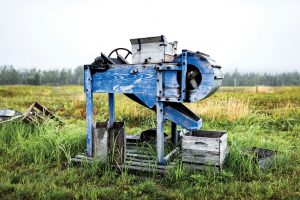
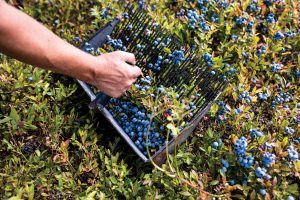
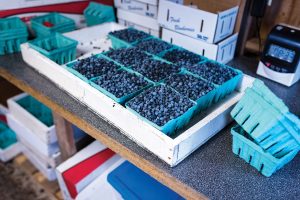
Fresh Blueberry Pie
The legendary blueberry pie at Helen's Restaurant in Machias is made with Welch Farm berries
and was featured on Food52.com last summer. Helen’s owner Julie Barker, whose father processed blueberries on his Washington County farm, says this original recipe, handwritten and stenciled, is unchanged since Helen and Larry Mugnai opened the restaurant in 1950.
For 6 servings
BLUEBERRY GEL
3 tablespoons frozen blueberries
¼ cup plus 2 tablespoons sugar
½ cup water
½ ounce cornstarch
PIE CRUST
3 cups flour
1 ½ cup shortening 1 teaspoon salt
3 tablespoons water
BLUEBERRY PIE
1 ½ quarts fresh Maine wild blueberries
1 cup blueberry gel
1 quart heavy whipping cream
½ cup sugar
1 teaspoon vanilla extract
1. Make the blueberry gel. In a double boiler over medium-low heat, mix together the frozen blueberries, sugar, water and Let simmer until thickened. Remove from heat and let cool.
2. Mix together the flour, shortening, salt, and water for the pie dough just until fi Shape into a 9-inch pie pan and crimp the edges and chill it for at least 30 minutes. Preheat your oven to 325°F. Then, once you are ready to bake, dock or prick the chilled dough all over with a fork and bake it for 25 minutes or until golden brown around the edges. Let cool.
3. Combine the blueberries and cooled gel together in a large bowl and add the mixture to the pie crust.
4. Whip the whipping cream with the sugar and vanilla and then spread a thick layer all over the top of the blueberries.
5. Garnish the whipped topping with extra blueberries. Chill until solid and can be easily cut with a Cut into six generous pieces!
Enjoy.
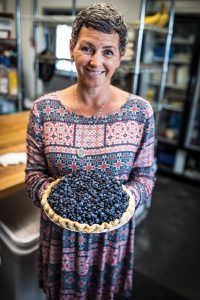
This article is from the 2017 issue of our Maine Farms journal. Make sure to look through our archives.
Sign up for our monthly email newsletter.